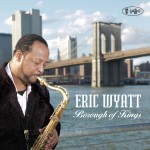burningambulance.com
When you read the phrase “Brooklyn jazz” in 2014, you probably don’t think of a guy likeEric Wyatt. You probably think of young men in untucked plaid shirts with glasses and beards, and young women who look like substitute teachers, playing winding melody lines that take a minute and a half to resolve, or clattering and honking in improvised spasms, or crossing old-country folk with grindcore and arranging it for soprano saxophone, laptop and trap drums… Not Wyatt. He looks like a cross between Forest Whitaker and the Simpsonscharacter Bleeding Gums Murphy, and his music is swinging, bluesy hard bop, straight out of the 1960s. Still, he’s about as “Brooklyn jazz” as you can get—a lifelong resident of the borough, with bone-deep ties to the straightahead jazz world (he’s Sonny Rollins‘ godson). Wyatt made his debut as a leader in 1997—his Posi-Tone debut, Borough of Kings, is his third studio release, and fifth album overall—and has appeared on several discs by trombonistClifton Anderson and Rodney Kendrick.
On the majority of Borough of Kings (buy it from Amazon), Wyatt is joined by pianist Benito Gonzalez, bassist Ameen Saleem, and drummer Shinnosuke Takahashi. A few guests appear as well—Kyle Poole takes over the kit on the surprising “Can He Come Out,” which also features Duane Eubanks on trumpet, and Wyatt playing an electric saxophone; and Anderson plays trombone on the album-closing “What Would I Do Without You.”
The album kicks off with “The Peoples Champ,” a midtempo number on which the lyricism of Gonzalez’ piano conjures a Latin McCoy Tyner, Takahashi’s drumming has a heavyweight’s swing and force, and Wyatt’s saxophone playing is in the mode of Joe Henderson—but the Joe Henderson of 1964, not 1994. This is a fanfare, a wake-up call. The follow-up, “One for Hakim,” keeps the energy level high; it’s built on another rock ‘em sock ‘em groove from Takahashi, and Wyatt heads into a zone not far from where his godfather was hanging out in the East Broadway Run Down era. The title track is up next, and it’s surprising—it begins in the slow, incantatory of John Coltrane circa Crescent, but at the 90-second mark, it launches into double time, and becomes something very close to “Countdown,” from 1959’s Giant Steps. Which is weird, considering that there’s a version of “Countdown” four tracks later…
“Can He Come Out,” the fourth piece on the album, makes for a sharp left turn. Wyatt’s electric saxophone sounds like it’s being fed through a wah-wah pedal (it starts to recall the theme from Sanford & Son after a while), and drummer Poole offers sharp, funky breakbeats in place of the swinging jazz grooves that dominate the album. Guest trumpeter Eubanks plays loose, strutting lines atop the rhythm, as Gonzalez and Saleem keep the middle ground rock-steady. When the two horns begin to trade phrases, then harmonize, the whole thing comes together as a perfect modernization of Wyatt’s traditionalist aesthetic, with just enough weirdness (via electro-sax) to make it a compelling interlude that feels too short when it ends.
“Ancient Chinese Secret” kicks off the album’s second half with some flute that doesn’t reappear until its final 30 seconds. The bulk of the piece stomps in a manner somewhere between Branford Marsalis‘s current group and the David S. Ware Quartet at their most melodic (think 2000’s Surrendered). On “Quest,” Wyatt picks up the soprano sax, and it lasts 10 minutes or a thousand years, depending on your perceptions. Then comes the aforementioned version of “Countdown,” which is nearly three times as long as the original, and not nearly as frantic or showy. Wyatt takes the melody of the piece, which originally showed up only at the end, after two minutes of frantic soloing—first from drummer Art Taylor, then Coltrane—and decides to play it as a traditional composition, rather than a vehicle for demonstrating his speed. And since it’s a pretty nice melody, this turns out to be a really good idea.
The album concludes with “What Would I Do Without You,” the title of which suggests that it should be a ballad. It’s not, really. It’s uptempo, but it’s got a rotund mellowness (mostly due to Clifton Anderson‘s presence on trombone) that makes it an ideal closer. Anderson is a slick player, rarely smearing his notes to excess, and he makes a great foil for Wyatt; their solos, and particularly their interactions in the piece’s final minute, sound like two lifelong friends telling stories they both know already, but which still make each other laugh.
Eric Wyatt is a terrific, powerful saxophonist who deserves much more attention than he’s gotten to date. For people to start thinking of him when they hear the phrase “Brooklyn jazz” wouldn’t be a bad thing at all.







